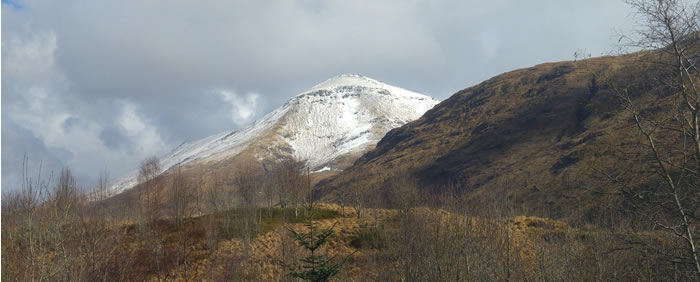
I’m currently reading an interesting book – Uncommon Ground – A word-lover’s guide to the British landscape by Dominick Tyler.
One thing I’ve learnt from it, is that there are quite a few words in Scottish Gaelic related to hills and mountains:
Beinn [beiɲ / beɲə] = mountain, mount; high hill, pinnacle; head, top, high place. It comes from the Old Irish benn (peak, point, pinnacle), from the Proto-Celtic *benno- (peak, top).
Sgurr [sguːrˠ / sgurˠə] = high pointed hill, peak; cliff, craig.
Stob [sdɔb] = point, pinnacle; stake; pointed iron stick; prickle, thorn; stump; sharp-pointed stick; to prick, prod.
Meall [mjaul̪ˠ / mjal̪ˠəɣ] = mound, round hill; pile, heap; lump, clot, mass; (rain) shower; bout. It comes from the Old Irish mell (a ball, sphere, round mass; a round protuberance, swelling).
Stùc [stuːxg] = little hill jutting out from a greater, steep on one side and rounded on the other; cliff; pinnacle of a roof; horn; scowl; rock; lump; conical steep rock; precipice.
Stòr [sdɔːr] = steep, high cliff; broken or decayed tooth.
Coire [kɤrʲə] = circular hollow surrounded by hills; mountain dell; whirlpool.
Cnoc /krɔ̃xg/ = hill: small hill, hillock, knoll; chilblain. It comes from the the Old Irish cnocc (hill, lump, stump), from Proto-Celtic *knokkos (hill).
Cruachan [kruəxan] = conical hill; hip.
Mam [maum] = rounded hill/mountain; mountain gap/pass; boil; bulge.
Cnap [krãhb] = small lumpy hill; knob, lump, protrusion; block; boss, node; swelling; button; potato; gust of wind; thump, thud. It is a borrowing from the Old Norse knappr (knob, stud, button), or the Old English cnæp (top of a hill, button, brooch).
Tiumpan [tʲũːmban] = one-sided hill; timbrel, tabret; tambourine; backside, bum.
Binnean [biɲan] = high conical hill; apex, high point; pinnacle.
Cruachag [kruəxag] small round hill; small pile/stack; small clamp (stack).
Dùnan [duːnan] = small hill; small fortress; dunghill; midden.
Torr [tɔːrˠ] = hill, mountain of an abrupt or conical form, lofty hill; Eminence; mound, large heap.
Monadh [mɔnəɣ] = mountain (covered with moors); high-lying moorland; expanse of heather.
Sliabh [ʃʎiəv] = hillside, slope; mountain. It comes from the Old Irish slíab (mountain, mountain range, moor), from the Proto-Celtic *slēbos (mountain).
Note: not all these words feature in Uncommon Ground.
Some of these words appear mainly in place names, and may be used in songs and poems, but are not used in everyday Gaelic.
Sources: Wiktionary, Am Faclair Beag, Bosworth-Toller Anglo-Saxon Dictionary
I’m a native Gaelic speaker. Of the words listed the ones that are still – at least in my area/experience – are still used and readily understood by all ages are:
Beinn, Cnoc, Cruachan, Cruachag.
Monadh would be understood, though at least in my area we usually say ‘Moinnteach’.
I heard that the same phenomenon occurs with the language(s) of the Eskimos/Inuits, but they have a bunch of words for the different types of snow.
Artie – there are four basic snow terms in some Eskimo languages, and fewer in others. The idea that they have hundreds of words for snow is not true.
Here are snow-related words in Central Alaskan Yupik, for example, https://www.princeton.edu/~browning/snow.html
See also The Great Eskimo Vocabulary Hoax: http://users.utu.fi/freder/Pullum-Eskimo-VocabHoax.pdf